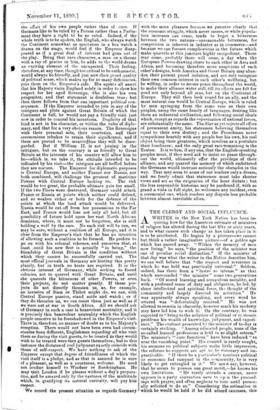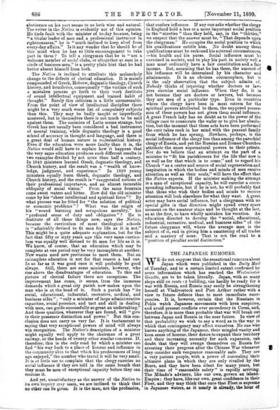THE CLERGY AND SOCIAL INFLUENCE.
AWRITER in the New York Nation has been in- quiring how far the American estimate of ministers of religion has altered during the last fifty or sixty years, and to what causes such change as has taken place in it. is to be attributed. He begins by a picture—we cannot but think a rather imaginative picture—of a golden age which has passed away. "Within the memory of men now living," he says, "the position of the minister was one of peculiar social distinction." If the minister of that day was what the writer in the Nation describes him, we can well believe that "the respect and reverence in which he was held was practically universal." Seldom, indeed, has there been a "lustre so intense" as that which surrounded "the minister" some two generations back. "Of sound learning and scrupulous morality, and with a profound sense of duty and obligation, he led, by sheer intellectual and spiritual force, the thought. of the community and largely directed its activities." He was apparently always speaking, and every word he uttered was "deferentially received." He was not allowed to remain in obscurity, however much his modesty may have led him to wish it. On the contrary, he was expected to " bring to the solution of political or ecmoinic problems his wealth of knowledge, judgment, and experi- ence." The contrast presented by the minister of to-day is certainly striking. "Among educated people, none of the so-called learned professions is held in so slight esteem." The minister's*" cure functions" have been reduced "to near the vanishing point." His counsel is rarely sought,. his sermons on political subjects make little impression, the reforms he suggests are apt to be visionary and
im-
practicable. "If there be a ptriicubirly specious political or economic fad rampant in the community, be is very likely to get entangled in it." We Inuit say, however, that he seems to possess one great merit,—he knows his own limitatiobs. "He rarely attends a caucus, never appears in a party Convention save to op ei the proceed- ings with prayer, and often neglects to vote until person- ally solicited to do so." Considering the estimation in which he would be held if he did attend caucuses, this abstinence on his part seems to us both wise and natural. The writer in the Nation, is evidently not of this opinion. He finds fault with the minister of to-day because, being "a titular leader of men and a professional instructor in righteousness," be is "much inclined to keep aloof from every-day affairs." Is it any wonder that he should be of this mind when he has so little encouragement to take part in them ? To tell a clergyman that he is "not a welcome member of social clubs, or altogether at ease in a circle of business men," is a pretty plain hint that he had better absent himself from both.
The Nation is inclined to attribute this melancholy change to the defects of clerical education. It is mainly compounded of Greek, Hebrew, dogmatic theology, Church history, and homiletics, consequently "the victims of such a mistaken process go forth to their work destitute of sound intellectual equipment and trained habit of thought." Surely this criticism is a little unreasonable. From the point of view of intellectual discipline there might be a very much worse list of compulsory subjects than this. They may be badly taught or imperfectly mastered, but in themselves there is not much to be said against them. The omission of Latin seems strange, but Greek has not usually been considered a bad instrument of mental training, while dogmatic theology is a good school of accuracy in thought and language, and there is a great deal of human nature in ecclesiastical history. Even if the education were more faulty than it is, the Nation would still have to explain how it happens that the very same education produces such different results in two examples divided by not more than half a century. In 1849 ministers learned Greek, dogmatic theology, and Church history, and the result was a "wealth of know- ledge, judgment, and experience." In 1899 young ministers equally learn Greek, dogmatic theology, and Church history, and the result is "exaggerated notions of their professional importance, and an almost incurable obliquity of social vision." From the same fountain come sweet waters and bitter. How did the old minister come by his "sheer intellectual and spiritual force"? By what process was he fitted for "the solution of political or economic problems " ? What was the origin of his "sound learning and scrupulous morality," his "profound sense of duty and obligation " ? He is destitute of all these things now, says the Nation, because the curriculum of most theological schools is "admirably devised to fit men for life as it is not." This might be a quite adequate explanation, but for the fact that fifty or sixty years ago this very same curricu- lum was equally well devised to fit men for life as it is. We know, of course, that an education which may be complete at one period may be very incomplete at another. New wants need new provisions to meet them. But an incomplete education is not for that reason a bad one. In so far as it was good once it will probably be good always. Still, there are some ministers, however, who rise above the disadvantages of education. To this sad picture of clerical failure there are exceptions. The improvement has come, it. seems, from the immense demands which a great city parish now makes upon the man who is at the head of it. Such a parish has "its social, educational, industrial, recreative, medical, and business sides " ; "only a minister of large administrative capacities, social presence, and tact and. skill in dealing with men, can guide successfully so great an undertaking." And these qualities, wherever they are found, will "give to their possessor distinction and power." But this con- clusion does not carry us very far. It is tantamount to saying that very exceptional powers of mind will always win recognition. The Nation's description of a minister might equally well apply to the chairman of a great railway, or the heads of twenty other similar concerns. If, therefore, this is the only road by which a minister can find "his way back to a place of honour and influence in the community akin to that which his predecessors of long ago enjoyed," the number who travel it will be very small. It. is ot little use to complain that the clergy exercise no social influence if they are told in the same breath that they must be men of exceptional capacity before they can exercise it.
And yet, unsatisfactory as the answer of the Nation to its own inquiry may seem, we are inclined to think that no other can be given. It is the man, not the profession, that confers influence. If any one asks whether the clergy in England hold a less or a more important social position in the "nineties " than they held, say, in the "thirties," we suspect that the answer must be, "That depends upon the clergyman." He occupies the social position to which his qualifications entitle him. No doubt among these qualifications must be reckoned his external circumstances, —his health and his purse. Social influence must IQ exercised in society, and to play his part in society well a man must. ordinarily have a fair constitution and a fair income. But, assuming that he has these, the amount of his influence will be determined by his character and attainments. It is an obvious commonplace, but it is the only observation that the subject admits of, Nobody thinks of inquiring whether doctors or law- yers exercise social influence. 'When they do, it is not because they are doctors or lawyers, but because they are men of a particular type. Even in countries where the clergy have been in most esteem for the spiritual powers attributed to them, the supposed posses- sion of these powers has not given them social influence. A great French lady has no doubt as to the power of the village cure to consecrate the wafer or to give her absolu- tion, but the moment that these acts have been performed the cure takes rank in her mind with the peasant family from which he has sprung. Nowhere, perhaps, is the social influence of the clergy less than among the parochial clergy of Russia, and yet the Russian and Roman Churches attribute the same supernatural powers to their priests. Nor do we believe that an attempt on the part of a minister to "fit his parishioners for the life that now is as well as for that which is to come," and to regard his Church "as a centre and source of social regeneration and inspiration in which the bodies and minds of men receive attention as well as their souls," will have the effect that the Nation expects. If the minister making the attempt is a man of exceptional capacity, he will exercise a corre- sponding influence, but if he is not, he will probably find that those who wish their bodies and minds to receive attention will look elsewhere for what they want. A great actor may have social influence, but a clergyman with no special gifts in that direction might spend every spare moment on the amateur stage and be thought at the last, as at the first, to have wholly mistaken his vocation. An education directed to develop the "social, educational, industrial, recreative, medical, and business sides" of the future clergyman will, where the average man is the subject of it, end in giving him a smattering of all trades and a mastery of none. That is not the road to a "position of peculiar social distinction."











































 Previous page
Previous page